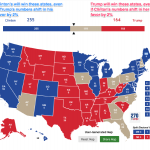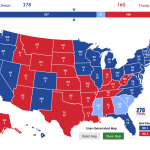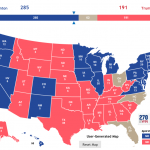270 to win
A couple of weeks ago, it was impossible to find a pundit or poll maven who saw a Trump victory as a possibility. I made the audacious claim at the time that this was incorrect, and I've been taking heat from it since then. Much of this widespread misunderstanding is ironically caused by the good work of the folks at FiveThirtyEight and their imitators such as the New York Times, who have been publishing probability statements about the outcome.
If I know for near certain that Mary is going to beat Joe in an election, then I can say something like this:
Probability of winning
Mary: 97%
Joe…
Above is my latest electoral college projection.
This uses the technique previously described. However, instead of using RCP averages for all polled states and then using extreme (non-tossup) states to develop the regression model, this method uses only polling from states with one or more recent poll, and only with good polls. these poll numbers are then "predicted" by black/hispanic/white/Voted_Romney numbers, and that generates a model, based on just over 20 states, designed to predict all the states.
As expected, the r-squared value is much lower using this method, but this method does…
I've made my first stab at a prediction for the electoral college outcome for the US Presidential race, 2016. I use a roughly similar methodology as I did to accurately predict most of the Democratic primaries. However, since primaries are different from a general, the methodology had to be adapted.
For the primaries, I eventually used this methodology. I used results form prior primaries to predict voter behavior by ethnicity, in order to predict final behavior. That worked because primaries are done a few states at a time, and because all the people being modeled were Democrats.
It turns…


